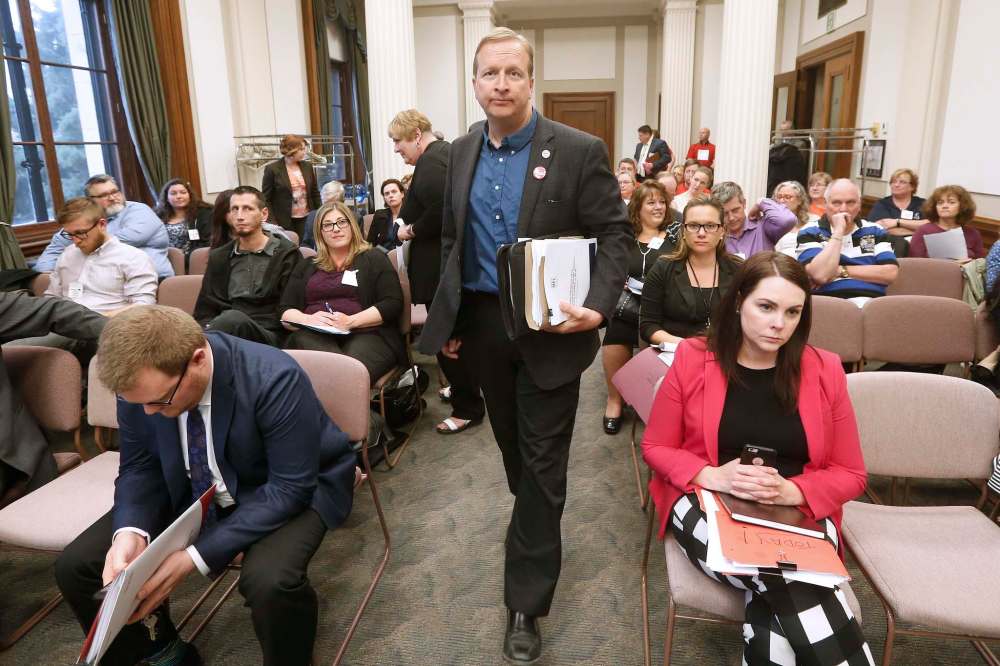Cancel bill, nurses union urges
Health-care bargaining legislation could 'cause significant disruption,' critics contend
Advertisement
Read this article for free:
or
Already have an account? Log in here »
To continue reading, please subscribe:
Monthly Digital Subscription
$0 for the first 4 weeks*
- Enjoy unlimited reading on winnipegfreepress.com
- Read the E-Edition, our digital replica newspaper
- Access News Break, our award-winning app
- Play interactive puzzles
*No charge for 4 weeks then price increases to the regular rate of $19.00 plus GST every four weeks. Offer available to new and qualified returning subscribers only. Cancel any time.
Monthly Digital Subscription
$4.75/week*
- Enjoy unlimited reading on winnipegfreepress.com
- Read the E-Edition, our digital replica newspaper
- Access News Break, our award-winning app
- Play interactive puzzles
*Billed as $19 plus GST every four weeks. Cancel any time.
To continue reading, please subscribe:
Add Free Press access to your Brandon Sun subscription for only an additional
$1 for the first 4 weeks*
*Your next subscription payment will increase by $1.00 and you will be charged $16.99 plus GST for four weeks. After four weeks, your payment will increase to $23.99 plus GST every four weeks.
Read unlimited articles for free today:
or
Already have an account? Log in here »
Hey there, time traveller!
This article was published 08/05/2017 (3141 days ago), so information in it may no longer be current.
Labour unions urged the Pallister government Monday evening to scrap a bill that would shrink the number of health-care bargaining units in Manitoba and force them to compete with each other for members in a series of representation votes.
While the government has said the goal of its proposed legislation is to streamline the collective bargaining process, the unions argued that the system already works efficiently with joint bargaining taking place on such major issues as wages, benefits and pensions.
They also said they’ve offered government an alternative proposal to Bill 29 (The Health Sector Bargaining Unit Review Act) but have yet to receive a response.

“This bill has the potential to cause significant disruption in our health-care system,” said Sandi Mowat, president of the 12,000-strong Manitoba Nurses Union.
“At a time when our health-care system is facing cuts and restructuring we simply don’t need an additional distraction,” Mowat told a multi-party committee of MLAs.
Bill 29 would create seven bargaining units for each health region and provincewide employer. By the government’s count, there are 182 health-care bargaining units in Manitoba. There are five health regions in the province.
Unions representing health-care workers repeatedly told the public hearing that they are willing to work with the government to develop an alternative to the bill that all could live with.
Kevin Rebeck, president of the Manitoba Federation of Labour, noted that the proposed legislation would establish employer councils to bargain with unions in each region. He said the unions would be willing to create labour councils to bargain contracts on behalf of workers.
He said the proposal by organized labour is doable and preferable to Bill 29, while avoiding the uncertainty and disruption of holding a series of votes among tens of thousands of health-care workers to decide which union would represent them.
“We urge the government to hit the stop button — or at minimum the pause button — on Bill 29 and allow us some time to work with Manitoba Health on a better way forward,” Rebeck said.
Michelle Gawronsky, president of the Manitoba Government and General Employees Union, called Bill 29 “heavy-handed.”
“I have been through three rounds of representation votes, and I know first-hand just how disruptive they are,” she told the legislative committee. “To claim they are necessary to improve patient care ignores this reality.”
Beatrice Bruske, with Local 832 of the United Food and Commercial Workers, said what concerns her union most is that the bill appears “simply to be a way to pit unions against one another.”
“Hospitals are a very stressful place for our members to work,” she said. “This bill and the resulting amalgamation votes would be a distraction for our members, quite frankly.”
UFCW represents hospital support workers, health-care aides as well as social workers, physiotherapists and occupational therapists.
Rebeck said any effort to reform collective bargaining in the health sector should adhere to three basic principles: protecting and improving patient care; supporting and respecting health-care professionals in their work; and respecting the democratic decisions health-care workers have made in choosing which union to represent them.
The public hearing into Bill 29 occurred simultaneously with a hearing on the Pallister government’s public sector wage bill.
More than 50 people attended the meeting, with some visiting both sessions, just down the corridor from each other on the second floor of the Legislative Building.
Health Minister Kelvin Goertzen attended the committee hearing, but asked few questions. He mainly thanked presenters for their submissions. A total of 31 people were scheduled to speak.
larry.kusch@freepress.mb.ca

Our newsroom depends on a growing audience of readers to power our journalism. If you are not a paid reader, please consider becoming a subscriber.
Our newsroom depends on its audience of readers to power our journalism. Thank you for your support.



